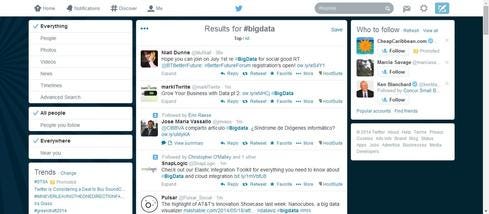LinkedIn Tips: Judging Your Profile Popularity
LinkedIn's "How You Rank" tool shows how your profile views stack up against your co-workers and connections.


10 Big Data Pros To Follow On Twitter
10 Big Data Pros To Follow On Twitter (Click image for larger view and slideshow.)
LinkedIn's "Who's Viewed Your Profile" section is one of the social network's most popular features. In February, LinkedIn redesigned it to provide more detailed analytics about who checked you out, including the industries they work in and their job titles.
Now the social network has added another feature to this section that taps into how much traffic your profile generates compared to your connections and other people from your company.
"With the new 'How You Rank' tool, you can now see where you stack up to others in your network with profile views," said LinkedIn product manager Dmitry Shevelenko in an announcement. "We know that no two professionals are alike, and by seeing how you rank relative to your professional peers, we believe you'll have the added information and incentive to help you put your best foot forward on LinkedIn."
The new "How You Rank" tool is accessible from a tab on your Who's Viewed Your Profile page.
LinkedIn displays your rank among your connections at the top -- both in percentage and numerical rank -- and shares whether your rank has improved or decreased in the last week. This information is visible only to you; your connections cannot see it.
[Improve your LinkedIn profile and position yourself for what's next. Read LinkedIn Tips: 10 Steps To A Stronger Profile .]
Below your rank are two more tabs: Your Company and Your Connections. These display where your profile views rank among your coworkers and people you're connected to. Scroll through each list to view whose profile is more popular than yours, and who ranks below you.
"Take a look at the top profiles in your network to gain inspiration for changes you can make to your own profile, or content you can share to increase views to your profile and drive opportunities for advancement," Shevelenko said.
LinkedIn also offers custom recommendations in the right-hand column of your rank page to help you increase your profile views. These may include updating your summary so you appear in the right searches; joining groups related to your industry and expertise; and adding more skills, which will improve your visibility in search results.
The new How You Rank feature is a handy tool for all LinkedIn users, according to LinkedIn. If you're looking for a job, hiring managers are more likely to look at your profile if you look at theirs, Shevelenko said. "Nearly 80% of candidates today are found through networking -- so if you notice a recruiter at a company you're interested in has viewed your profile, don't be afraid to reach out to them."
If you're a consultant, LinkedIn recommends using the tool to identify who in your network can help increase your visibility and attract new business and connections. And if you're a student or new graduate, look to connections ranked higher than you for best-practices in creating an effective profile.
"If you notice someone viewed your profile from an industry you're interested in joining, don't be afraid to reach out, introduce yourself, and see what words of wisdom they might have for someone just starting out," Shevelenko advised.
How You Rank is available to most desktop users now and will be available on mobile at a later date.
What do Uber, Bank of America, and Walgreens have to do with your mobile app strategy? Find out in the new Maximizing Mobility issue of InformationWeek Tech Digest.
About the Author
You May Also Like






